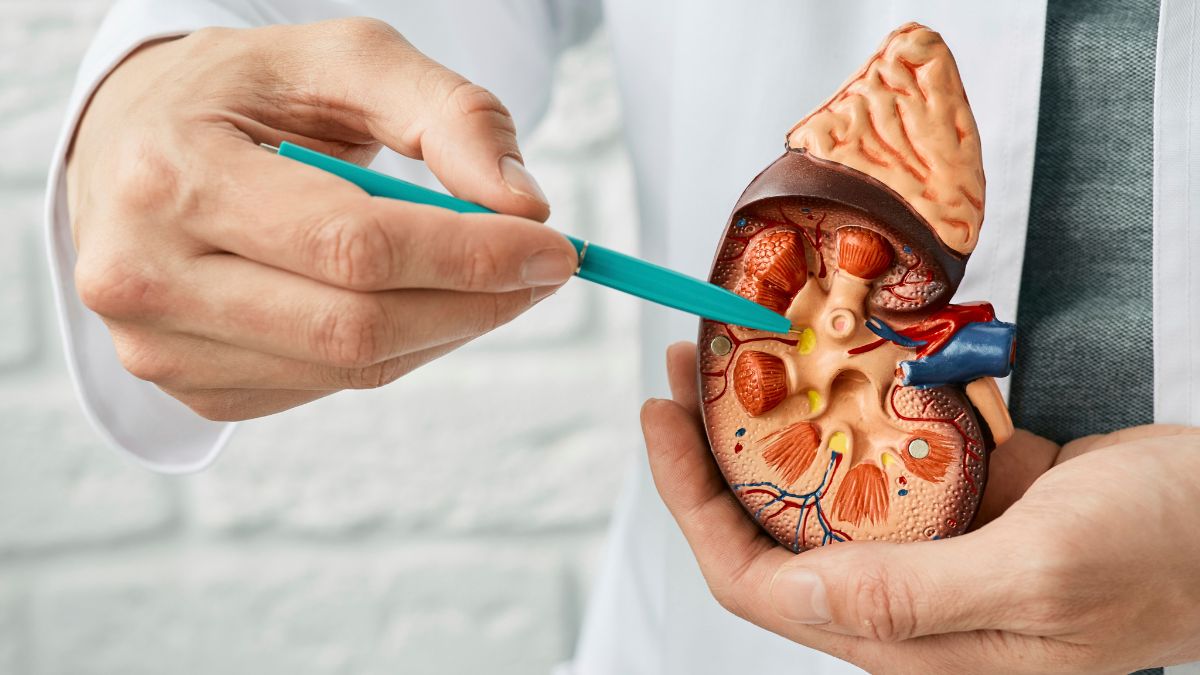- By Priyanka Munshi
- Sat, 30 Mar 2024 05:02 PM (IST)
- Source:JND
Seasonal variations in weather, food habits, and hydration levels can all affect how kidney problems present themselves. Dehydration becomes a problem in the summer because people tend to perspire more and may not drink enough water, which increases the risk of kidney stones and UTIs. Wintertime lows can narrow blood vessels, which may have an impact on renal function and raise the risk of complications for individuals who already have kidney problems.
Kidney health can also be impacted by seasonal dietary variations, such as eating heavier, higher-protein meals in the winter or more salty foods in the summer.
In a conversation with Jagran English, Dr. Sashi Kiran A, who is a consultant nephrologist at Yashoda Hospitals in Hyderabad, talked about tips on how to prevent kidney disease, especially in different seasons.

Winters can narrow blood vessels, affecting renal function and increasing complications.(Image Credit: Canva)
According to Dr. Sashi, your kidneys, those remarkable fist-sized organs nestled at the base of your rib cage on both sides of your spine, play a vital role in your overall well-being. These multifunctional powerhouses filter waste products, regulate fluid levels, and even produce hormones that impact blood pressure and red blood cell production. Ensuring their health is crucial for your body’s proper functioning.
Also Read: 5 Best And Effective Home Remedies To Deal With Period Cramps
Changes in weather present unique challenges in safely guarding our kidneys. Here are some summertime tips to help protect your kidneys during the warm months:
1. Stay Active: Sunny summer days are perfect for outdoor activities. If you have kidney disease, consult your doctor before starting an exercise routine. Walking and yoga are gentle exercises that can benefit your health.
2. Balance Fluid Intake: Check with your dietitian or healthcare team to determine if your fluid intake needs adjustment on days spent outdoors. Avoid very cold beverages, as they can cause stomach cramps. Lemon water or mouthwash sprays can help combat dryness.
3. Sun Protection: Shield your skin from sun exposure. Apply sunscreen with an SPF of at least 15, reapplying every two hours. Cover up with a hat, sunglasses, or sit in the shade to protect your skin.
4. Wear Sunglasses: Just as sunscreen protects your skin, sunglasses safeguard your eyes. Choose wraparound sunglasses that block at least 99% of UVB rays and 50% of UVA rays.
5. Swimming Precautions: If you’re on dialysis, consult your doctor for tips on protecting your access while swimming. Cover vascular access with a protective dressing. For peritoneal dialysis, immobilize the catheter during swimming. Stick to chlorinated pools or the ocean to minimize infection risk.
6. Kidney-Friendly Foods: Fill your plate with kidney-friendly foods low in phosphorus and potassium. Fruits and vegetables are essential for good health.
During the chilly winter months, it’s essential to take care of your kidneys, especially if you have kidney-related concerns. Here are some practical tips to safeguard your kidney health:
1. Monitor Blood Pressure: The cold weather can cause arteries to constrict, leading to increased blood pressure. Check your blood pressure regularly and use medications accordingly.
2. Stay Hydrated: Even though it’s tempting to reduce water intake in colder weather, proper hydration is crucial. Aim for at least eight glasses of water a day.

Dietary choices, such as heavy protein meals in winter and salty foods in summer, also affect kidney health.(Image Credit: Canva)
3. Control Blood Sugar Levels: The winter months may lead to elevated blood sugar levels due to reduced physical activity and dietary changes (such as consuming winter snacks). If you are diabetic, get your medications adjusted accordingly.
4. Prompt Bathroom Visits: When you feel the urge to urinate, respond promptly.
During the rainy season, it’s essential to take care of your kidneys to prevent health issues. Here are some tips to protect your kidneys:
1. Stay Hydrated: Drink plenty of fluids to prevent dehydration. Adequate water intake helps maintain kidney function and flush out toxins.
2. Avoid Stagnant Water: Refrain from swimming in or drinking from stagnant water. Contaminated water can lead to infections that affect kidney health.
3. Hand Hgiene: Wash your hands frequently with soap and water. Good hygiene reduces the risk of infections, including those that impact the kidneys.
4. Use Insect Repellent: Protect against mosquito bites by using insect repellent. Mosquitoes can transmit diseases like malaria, which may affect kidney function.

